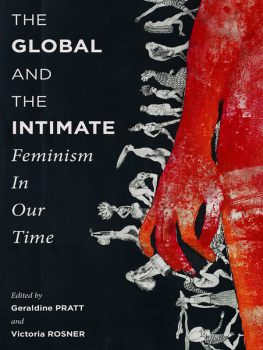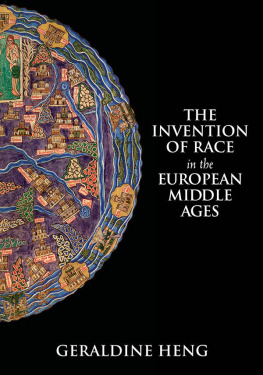THE GLOBAL AND THE INTIMATE
Gender and Culture
THE
GLOBAL
AND
THE
INTIMATE
Feminism
in
Our
Time
Edited by
Geraldine PRATT
and
Victoria ROSNER
COLUMBIA UNIVERSITY PRESS NEW YORK
Columbia University Press
Publishers Since 1893
New York Chichester, West Sussex
cup.columbia.edu
Copyright 2012 Columbia University Press
All rights reserved
E-ISBN 978-0-231-52084-3
Library of Congress Cataloging-in-Publication Data
The global and the intimate : feminism in our time/edited by Geraldine Pratt and Victoria Rosner.
p. cm.(Gender and culture)
Includes bibliographical references.
ISBN 978-0-231-15448-2 (cloth : alk. paper)ISBN 978-0-231-15449-9 (pbk. : alk. paper)ISBN 978-0-231-52084-3 (e-book)
1. FeminismCase studies. 2. Intimacy (Psychology)Case studies.
I. Pratt, Geraldine. II. Rosner, Victoria.
HQ1154.G55 2012
305.42dc23
2012003963
A Columbia University Press E-book.
CUP would be pleased to hear about your reading experience with this e-book at .
References to Internet Web sites (URLs) were accurate at the time of writing. Neither the author nor Columbia University Press is responsible for Web sites that may have expired or changed since the book was prepared.
The chapters Jamaica Kincaids Practical Politics of the Intimate in My Garden (book):, by Agnese Fidecaro; Narratives and Rights: Zlatas Diary and the Circulation of Stories of Suffering Ethnicity, by Sidonie Smith; and Security Moms in Twenty-First Century U.S.A.: The Gender of Security in Neoliberalism, by Inderpal Grewal have been revised from articles that originally appeared in WSQ: Womens Studies Quarterly 34.1/2 (2006).
CONTENTS




O ur friendship and collaboration began with an invitation to coedit an issue of Womens Studies Quarterly; we thank Cindi Katz and Nancy K. Miller for their intellectual matchmaking that brought us together. From tentative long-distance telephone calls between two strangers, in which we searched for shared sympathies and interests, the theme of the global and the intimate emerged. Our pleasure working together on the WSQ volume and our enthusiasm for the topic led to this second project, organized around the same theme; we are grateful to Gloria Jacobs for permission to reprint some essays here. We thank Jennifer Gieseking for arranging our first meeting at Mount Holyoke College in 2007, where we copresented introductory remarks at the Global and the Intimate conference and developed preliminary thoughts toward this volume and our introduction to it. We thank Rachel Adams for reading a first draft of the introduction and our anonymous referees for their helpful critical comments on the introduction and the manuscript as a whole. Thanks also to our series editor, Nancy K. Miller (once more!). Columbia University Press has provided a wonderful editorial home for this work; we are especially grateful to Jennifer Crewe. Our beautiful cover image appears courtesy of the artist, Mirta Kupferminc. Bonnie Kaserman and Sarah Zell helped us in preparing the manuscript, and the Canadian Social Sciences and Humanities Research Council provided financial support.
H ow many intimate relationships do you maintain through the Internet or over the phone? Can you touch those you love on a daily basis, or are you as likely to hear their voices through a text message or telephone call and see their faces on a computer screen? Do you live in the land of your birth, or did you or previous generations of your family originate in distant lands? Where did the food come from that you ingested today? When you rest your hands on your computer in the morning, do you ever think about where it was made and who made it? In a time of shrinking distances, virtual relationships, and increasing transnational interdependencies, the global and the intimate are more interwoven than ever. The people we care about, the things we put on or in our bodies, the money we earn, and the networks in which we circulate are ever more likely to collapse our habitual distinctions between near and far, strange and familiar, local and global.
Our pairing in this volume of the intimate and the global extends a longstanding feminist tradition of challenging gender-based oppositions by upending hierarchies of space and scale. Familiar feminist slogans like the personal is the political work by juxtaposing apparently incommensurate registers of experience and showing how categories defined in opposition to one another can produce pernicious exclusions. To disrupt traditional organizations of space, to forge productive dislocations, to reconfigure conventions of scale: these are the goals that underwrite many feminist investigations. In our own historical moment of growing global consciousness, they have led us to examine more carefully the ways in which the global and the intimate, typically imagined as mutually exclusive spheres, are profoundly intertwined.
because it imaginatively constructs the local as a defense against powerful global forces in a way that seems to confirm the force and inevitability of certain modes of global capitalist expansion. By the same token, the local is often conceived as a defense against the forces of global capitalism in ways that call up established gender hierarchies of feminine and masculine. Local/global is a straightforward binary opposition, juxtaposing two terms that occupy polar positions on a single map. Intimate/global, we would like to suggest, both is and is not a binary; while irrefutably a pairing, it juxtaposes and resists the flattening effect of most binaries by bringing together terms that, we will argue, offer an implicit critique of one another.
In shifting from the idea of the local to that of the intimate, we are employing terms that are not defined against one another but rather draw their meaning from more elliptically related domains. We step out of hierarchical ontologies of scale or frameworks of micro/macro or the general and specific. Intimacy is thus potentially and productively disruptive of the geographical binaries and hierarchies that often structure our thinking. By pairing the global and the intimate we aim to expose the patterns that recur when gender, sex, and the global imaginary combine. We have asked our contributors to show how the intimate and the global intertwine, to try and intervene in grand narratives of global relations by focusing on the specific, the quotidian, the affective, and the eccentric. We have also asked them to scrutinize the frames that we use to recognize and organize intimacy and to hunt for the global forces that quietly undergird personal experience and exchange.
Why is this exploration of the relationships between the global and the intimate a feminist project? Because we believe that the methodologies of feminism have proven particularly adept at exposing the universalist assumptions of international relations, social theory, and geographical models. Because feminism has a track record of success with slicing through the sometimes impersonal rhetorics of academic discourse. Because the sensitivities and suspicions that feminism has bred in us are part of what led us and our contributors to turn a skeptical eye on the occasionally uncritical affirmations of globalization. Because the same training has kept alive our collective belief that the analytical lens of gender relations can help to produce a more nuanced, complete, and just account of the world we share.

















